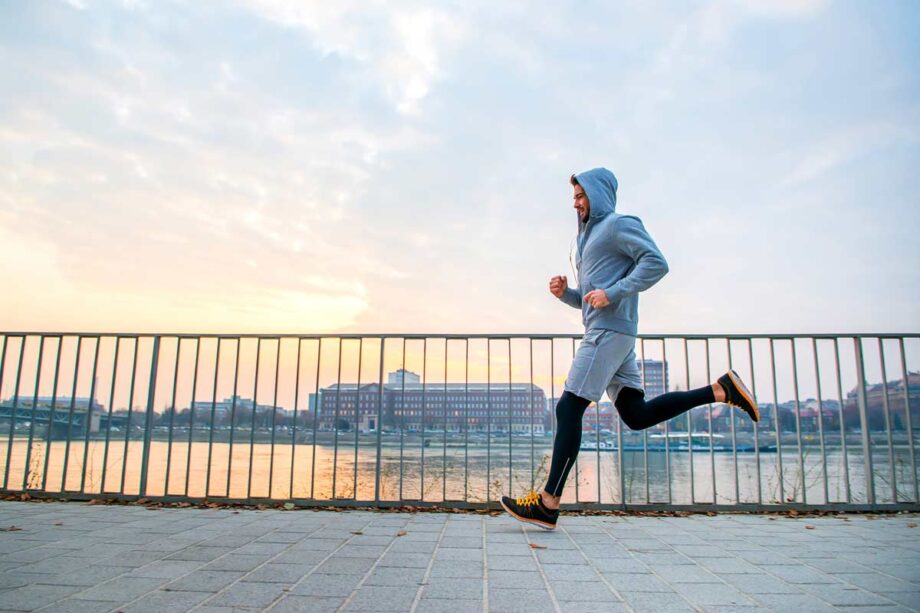2020 has been a heart blipping year. Some psychologists have even said its negative health impacts have been comparable to smoking. But it's also been a year of silver linings. From the luxury hotel industry to aviation – and of course health and fitness – there has been much innovation and opening of minds to new concepts – along with a renewed focus on physical and mental wellbeing.
Continuing in that vein, especially given the uncertain circumstances many now find themselves in, DMARGE interviewed mental health first aid instructor (and Trigger Point Canada Master Trainer) Nick Petrella, on the best exercises for reducing anxiety.
Petrella's main advice? Contrary to popular belief, if you're feeling particularly anxious, or if you have an anxious predisposition, then lifting heavy weights or doing circuit training are not ideal. These exercises, in fact, could cause you a "heightened heart rate... [just] like anxiety does," multiple times, with each set or exercise "mimicking" that same sensation you've been trying to avoid and also potentially "causing more anxiety."
"To be safe," Petrella continued, he finds it better to do something that "keeps the heart rate persistent." Think: running, walking, hiking; yoga. These kinds of activities "balance out the chemicals and the hormones."
View this post on Instagram
Health.com backs this up. A 2020 article the site published in June cites Ben Michaelis, PhD, an evolutionary clinical psychologist, saying running has "been shown to improve mood in a variety of ways" including "causing lasting changes in our 'feel good' neurotransmitters serotonin and norepinephrine, both during and after exercise."
"What's more," Health.com writes, is that "the repetitive motions of running appear to have a meditative effect on the brain."
"The mental benefits can be especially powerful for people who suffer from depression. In a 2006 review published in the Journal of Psychiatry & Neuroscience, researchers found evidence that exercise can work in a similar way to antidepressants, alleviating major depressive disorder by promoting the growth of new neurons in the brain," (Health.com).
All this said, every individual is different, and some people may find high-intensity workouts make them feel great – perhaps even providing them with a massive energy boost. In fact, Petrella told DMARGE, "high intensity... when I'm having a big day... helps me [personally] recover better."
He attributed this to these workouts helping build self-awareness (a baseline of suffering, if you will), from which the rest of your day feels easier by comparison. Petrella also explained that the distinction between mental and physical health is vanishingly small and that the two are highly interconnected.
"You can't have one without the other."
For this reason, Petrella recommends you "treat your body as one machine," learning when to listen to it and when to put yourself in more stress (and when not to). To aid you in this it helps to be organised, and have a structured week, exercising and going to sleep at the same time each day (and working on your sleep efficiency).
"Just because you're in bed doesn't mean quality sleep."
Petrella also stressed the importance of eating well, exercising in some capacity daily and "being honest with someone you can trust" as broader strategies for managing your mental health, beyond just what you do in the gym (or on the pavement).
While every individual should consult their doctor about their treatment options (regarding both anxiety and exercise programs), the US Department of Health and Human Services provides a useful standard amount of weekly exercise to compare your current level of anxiety to.
According to Health.com, "The agency suggests 150 minutes (2 hours and 30 minutes) to 300 minutes (5 hours) of moderate-intensity exercise a week. When that exercise ramps up to vigorous-intensity exercise, those recommendations lower to 75 minutes (1 hour and 15 minutes) to 150 minutes (2 hours and 30 minutes)."
We'll run to that.
Read Next
- Study By Leading Mental Health Institute Reveals Why Exercise Is So Damn Important Right Now
- Mental Health Professionals Urge Australians To Follow This Simple Daily Ritual
Subscribe to the DMARGE newsletter
Follow DMARGE on Instagram
Follow DMARGE on Facebook
The post Master Trainer Reveals Most Effective Exercises For Reducing Anxiety appeared first on DMARGE.
from DMARGE https://ift.tt/34vme5a








0 comments:
Post a Comment